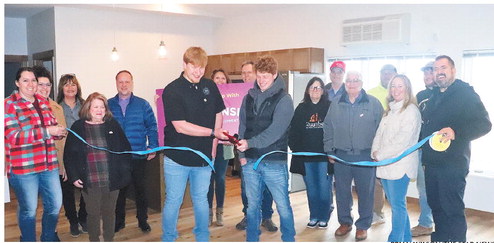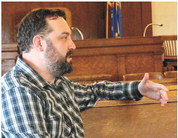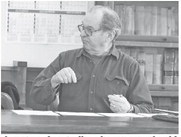Colby cheese proves to be a wedge issue
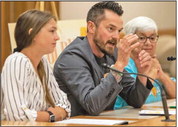

Supporters of state designation get some pushback in Madison
Testifying before lawmakers in Madison last week, Colby native Katerina Kolzow admitted that her hometown’s signature dairy product is not, in fact, her favorite cheese.
“It’s Muenster, followed by Gouda and then Swiss,” she said. “Colby is not my favorite cheese, but I’m in favor of this bill because it’s not about the popularity vote. It’s about the history.”
The bill she was referring to would designate Colby as the state’s official cheese in the Wisconsin Blue Book, which lists other state symbols such as the badger and the sugar maple.
Proponents of Colby cheese spent about an hour July 7 trying to convince lawmakers — several of whom were skeptical — to approve the state designation for Colby cheese.
Speaking at a public hearing held by the Assembly Committee on Local Government, Rep. Donna Rozar (R-Marshfi eld) and Sen. Kathy Bernier (R-Chippewa Falls) urged their fellow legislators to pass the bill out of committee.
Rozar and Bernier focused on the uniquely Wisconsin origins of the Colby cheese recipe and the cold water rinsing process developed by Joseph Steinwand in 1885 in the town of Colby.
“The young Steinwand modified the process of making the English cheddar cheese by rinsing the curds in cold water and not removing the excess moisture,” Rozar testified. “This revolutionary new process allowed for a cheese that was softer, more sliceable and mildly sweet as compared to the crumbly and less sweet flavor of popular, semi-hard cheeses like cheddar.”
The cold water wash is one of only a few cheesemaking methods native to the United States, and it helped give Wiscon- sin its reputation as America’s Dairyland, Rozar said.
Wisconsin cheesemakers produce over 45 million pounds of the “creamy delight” every year, she said, and have won over 100 awards for Colby cheese alone. That includes a World Cheese Championship won by cheesemaker Julie Hook.
Rozar said she is continuing the work of former Assemblyman Bob Kulp, who first introduced a bill to make Colby the state cheese in 2019. That bill died in committee, and Rozar was elected to replace Kulp in November of 2020.
“I didn’t know a lot about Colby cheese when I picked up the torch from Rep. Kulp, but I did learn that it was important to recognize a local municipality where something very small kind of launched Wisconsin on the ‘dairy state’ path,” she said.
Even though the initial attempt failed, Sen. Bernier said she’s going to continue lobbying for the bill’s passage until it makes it through the legislature.
“Wisconsin does cheese better than anybody else, and Colby is the Wisconsin original that helped transform our state into America’s Dairyland,” Bernier said.
Still, not all members of the committee were sold on the idea of picking just one cheese to represent the entire state of Wisconsin.
Chairman Todd Novak (R-Dodgeville) said his 51st Assembly District in southwest Wisconsin contains 25 of Wisconsin’s roughly 100 cheese factories, so he considers himself a bit of a “cheese guru.” In fact, he sponsored the bill to make cheese Wisconsin’s official dairy product, and even that was more difficult than it might seem, he said.
Novak said he would personally have a hard time picking one type of cheese over all of the others made and sold in Wisconsin.
“I do like Colby, but I like a lot of other cheeses,” he said.
Brick cheese, a derivative of American cheddar, also has its origins in Wisconsin, said Novak and Rep. Rick Gundrum (R-Slinger), who said he could not support the Colby cheese bill.
Gundrum pointed to Whidmer Cheese Cellars, located in Dodge County, and Joe Whidmer, a third-generation cheesemaker world-renowned for his brick cheese.
“I just have an issue making one cheese the state cheese,” he said. “We have a wide variety of stores and shops in my district that have a wide selection of Wisconsin cheese varieties that they sell.”
Rozar responded by saying that Colby still has a better claim for being declared the state cheese based on its strong association with a particular place.
“As far as I know, there is no Brick, Wisconsin,” she said. “There is no other town in Wisconsin named after the product that was formulated there.”
Most of the recipes for cheeses made in Wisconsin originally came from Europe, Bernier noted, brought here by German, Swiss and other immigrants.
“If we focus on just what made Wisconsin great in the cheesemaking world, it is Colby,” Bernier said.
Rep. John Macco (R-Ledgeview) took a somewhat flippant view of the discussion, noting that toilet paper could rightfully be declared a signature product from the paper industry in his district. He also mentioned that chicken booyah, a popular soup in his area, could be in the running for a special designation.
Still, Macco said he was all for “celebrating amazing regional delicacies that are indicative of the character of Wisconsin.”
“So, I’m in,” he said.
Three citizens, including two from Colby, testified in favor of the bill.
One of them was Ann Luckey, Steinwand’s great-granddaughter, who said the bill is an opportunity to recognize something that can truly be called a “Wisconsin original.”
“It started here in a small town and now it’s world-famous,” she said. “We should all join in the pride that people are feeling about Wisconsin.”
Kolzow talked about the pride she experienced growing up near the location of the cheese factory where Colby was originally invented.
“I believe in Colby cheese because it’s authentic, original and homegrown,” she said. “As a curious young girl who lived a mere mile north of the original factory, my cheese passion began because of that factory. I wanted to know more while exploring those remains.” Matt Oehmichen, perhaps the bill’s biggest booster, gave a passionate speech about why Colby deserves the title as Wisconsin’s state cheese.
“Of all our fine cheeses made in Wisconsin, only one bears the title of a Wisconsin native, that was born from a region that boasts the most dairy farms and dairy cows, and thrust Wisconsin into cheese dominance for over a century,” he said. “That’s Colby cheese.”
Oehmichen said the first attempt to pass the designation was accompanied by a lot of excitement in 2019, but he said the Wisconsin Cheesemakers Association “iced the enthusiasm” by coming up with excuses, which he believes came out of a concern for marginalizing other cheeses made in Wisconsin.
Although he said other cheeses shouldn’t feel threatened by Colby’s proposed status, he did brag about what he says are the uniquely successful characteristics of his hometown cheese.
“Colby went on to inspire 25 percent of all American-made cheeses,” he said, adding that it helped create one of the most iconic party snacks.
“If not for Colby, we wouldn’t have nachos,” he said. “You’re welcome, America.”
Oehmichen also dismissed brick cheese as just a “milder version of Limburger,” which he lightly mocked for its potent smell.
Novak later pointed out to Oehmichen that Limburger cheese is only made in one spot in the United States, and that’s Monroe, Wisconsin.
Rep. Robert Brooks (R-Saukville) said he appreciates the passion brought by Oehmichen and others, but he wondered why Wisconsin’s many dairy industry groups, such as the Wisconsin Dairy Council and Professional Dairy Producers of Wisconsin, were not there.
“These are all groups we meet with in this building on a regular basis, and not one of them is here today to testify in support of Colby,” he said. “If I were to get behind this, I would want to hear from a large number of these groups.”
Oehmichen said he, too, would like to know what all of those industry groups think, but he’s had a hard time getting them to take a position or even respond to his questions.
So far, the Dairy Business Association is the only trade group registered in favor of the bill. A representative of the Wisconsin Cheesmakers Association said they are not taking a position.
Having worked with all of the dairy trade groups before, Novak said cheesemakers are reluctant to say anything that would cause a rift in their industry.
“They don’t want to step on anybody else’s toes, and that’s probably why we’re not hearing from them,” he said.
Sen. Bernier emphasized the fact that their bill was not declaring one cheese to be superior over all the others.
“We’re not saying Colby is the ‘best’ cheese. We all have different palettes for cheese,” she said. “What we’re saying is that Colby cheese is the cheese that put Wisconsin on the map as the world’s greatest cheesemakers. That’s it.”
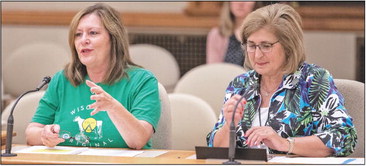
CO-SPONSORS -State Sen. Kathy Bernier and Rep. Donna Rozar speak before the Assembly Committee on Local Government. PHOTO SUBMITTED BY JOE KOSHOLLEK

